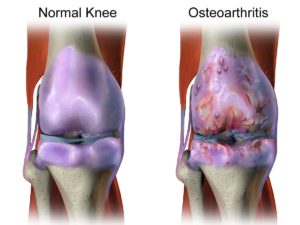Got Knee Osteoarthritis?
Got Knee Osteoarthritis?
If you have been recently diagnosed with arthritis, you may feel symptoms such as pain (dull/achy), joint stiffness, among other symptoms. As you may know, arthritis occurs when the cartilage in your joint gradually wears out over time (or sometimes from trauma to the joint years before), which causes increased bone on bone friction. Bones are highly innervated, making them very sensitive to pain. Due to this high innervation and increased bone on bone contact, it only makes sense why your pain and stiffness occurs!
While arthritis cannot be reversed, it can be managed! The more you move your knee, the more heat and lubrication you provide for your knee. Imagine that you knee is a like a rusted door hinge. If you keep opening and closing the door, you may get some creaking and grinding. However, if you stop moving the door for months, the next time you go to move the door, the door will be too stiff to move!
This is what makes physical therapy a great option for your knee. A physical therapist will construct a safe treatment program consisting of exercises and manual techniques based off their assessment at your initial evaluation. In addition, therapist may offer you modalities such as moist heat or electric stimulation to help decrease pain/stiffness. Each program will be custom made for each patient. Physical therapists also make sure they address any other cofounding factors that may be complicating your knee pain. Additionally, therapists always make sure your program is always appropriate for you and will modify exercises if increased pain is occurring. By modifying these exercises, physical therapists a protecting your knee from any more damage from exercise while improving your overall symptoms.
Even if having a knee replacement ends up being your end-result, physical therapy can assist in your preparation for surgery! Think about it this way, if you are getting any type of surgery, is it better to go into the surgery as strong, mobile, and flexible as possible? Or is it better to do nothing? The obvious answer is to take the proactive approach and get your knee as strong and flexible as possible before surgery! Studies have shown that having PT prior to knee replacements result in improved post-surgical outcomes. If you are unable to fully straighten or bend your knee prior to the surgery, and you expect to be able to without appropriately exercising, then you are going to have a difficult time achieving those goals after your surgery. In this respect, physical therapy can help improve post-surgical outcomes.
Regardless if you require a knee replacement, physical therapy can help improve your pain, strength, range of motion, and overall function for your arthritic knee. So, schedule an appointment to get evaluated by a physical therapist so that you can improve your quality of life today.
Disclaimer: This blog is for informational purposes only, please contact your doctor or physical therapist to fully evaluate your knee prior to make sure you are an appropriate candidate for therapy/surgery.
